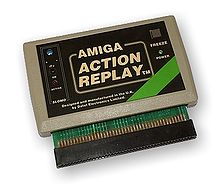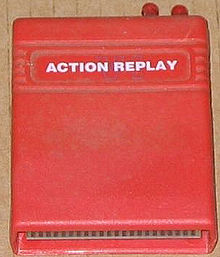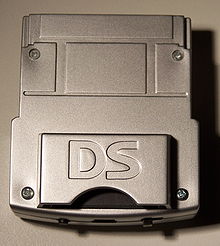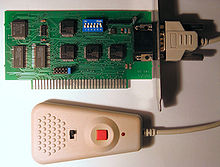- Action Replay
-
Action Replay ist ein Markenname der Firma Datel, unter dem ein Cheatmodul für Spielkonsolen und Computer verkauft wird. Das Steckmodul ist zurzeit für Nintendo GameCube, Game Boy Advance, PlayStation 2, Xbox, Nintendo DS und PlayStation Portable (PSP) erhältlich.
Inhaltsverzeichnis
Überblick
Das Steckmodul kann komplette Spielstände einfrieren und speichern, für die meisten Konsolen finden sich solche gespeicherten Speicherstände im Internet. Ferner können im Arbeitsspeicher abgelegte Daten eines laufenden Spieles manipuliert werden, um beispielsweise zusätzliche Leben, unendliche Munition für Waffen oder Ähnliches herbeizuführen.
Das erste Action Replay wurde in den 1980er Jahren für den C64 konstruiert, Nachfolger waren Action Replay II, III, IV und VI. Die Amiga-Version hieß ebenfalls Action Replay und enthielt eine per Potentiometer einstellbare „Bremse“, die die Arbeitsgeschwindigkeit und damit die Spielgeschwindigkeit herabsetzte. Hiervon gab es drei Versionen für den A500, A2000 und später den A1200. Nachfolger wurden die Versionen Action Replay Mk II und Mk III.
Versionen für Computer
- Commodore 64
- Action Replay
- Action Replay II
- Action Replay III
- Action Replay IV (1988)
- Action Replay V (1989)
- Action Replay VI
- Commodore Amiga
- Action Replay (A500 card / A2000 CPU card) (1989)
- Action Replay (A1200 card)
- Action Replay Mk II (A500 cart / A2000 CPU card) (1990/1991)
- Version 2.05, ROM-ID: „ACTION REPLAY AMIGA Mk II (V2.05 01/12/90)“
- Version 2.12, ROM-ID: „ACTION REPLAY AMIGA Mk II (V2.12 24/12/90)“
- Version 2.14, ROM-ID: „ACTION REPLAY AMIGA Mk II (V2.14 22/02/91)“
- Action Replay Mk III (A500 cart / A2000 CPU card) (1991)
- Version 3.09, ROM-ID: „ACTION REPLAY AMIGA MK III (V3.09 10/13/91)“
- Version 3.17, ROM-ID: „ACTION REPLAY AMIGA MK III (V3.17 12/17/91)“
- PC
- Action Replay PC (ISA card) (1994)
Versionen für Videospielkonsolen
8-bit-Ära
- Nintendo Entertainment System
- Pro Action Replay
- Sega Master System
- Pro Action Replay
- Sega Game Gear
- Pro Action Replay
16-bit-Ära
- Sega Mega Drive/Genesis
- Pro Action Replay
- Pro Action Replay 2
- Super Nintendo
- Action Replay Pro Mark I
- Action Replay Pro Mark II
- Action Replay Pro Mark III
32/64-bit-Ära
- Sega Saturn
- Pro Action Replay (USA)
- Game Buster (in Deutschland)
- Sony PlayStation
- Action Replay (1995)
- Pro Action Replay (1996)
- Action Replay CDX (1997)
- Equalizer Extreme (1998)
- Game Buster v3.1 (in Deutschland) (1998)
- Game Buster v3.2 (in Deutschland) (1998)
- Game Buster v3.3 (in Deutschland) (1998)
- Nintendo 64
- Action Replay Pro (1999)
- N64 Equaliser
- Game Buster V3 (in Deutschland) (1999)
Konsolen der sechsten Generation
- Sega Dreamcast
- Action Replay CDX
- Sony PlayStation 2
- Action Replay 2 (2000)
- Action Replay 2 V2 (2001)
- Action Replay 2 V2.1
- Action Replay 2 V2.2
- Action Replay 2 V2.34
- Action Replay MAX (2003, Update 2004)
- Action Replay MAX 3.13
- Action Replay MAX 3.14
- Action Replay MAX 3.60 EVO
- Action Replay MAX DRIVE
- Microsoft Xbox
- Action Replay (2002)
- Nintendo GameCube
- Action Replay (2003)
- Action Replay Version 1.11 (Jan/2004)
- Action Replay Version 1.18 (Mai/2004)
- Action Replay (2007) - Wii kompatible, aber funktioniert nicht mehr für die neuen „Firmware Versionen“ der Wii
- Nintendo Wii
- USB Gecko Adapter (2008) - benötigt einen installierten „Homebrew Channel“ ; Wii ↔ PC per USB Kabel um Spiele zu „Debuggen“
Versionen für Handhelds
- Nintendo Game Boy
- Pro Action Replay
- Action Replay Online
- Action Replay Extreme
- Sega Game Gear
- Pro Action Replay
- Nintendo Game Boy Color
- Action Replay Pro
- Nintendo Game Boy Advance
- Action Replay (2001)
- Action Replay Duo (2005)
- Action Replay MAX (2006)
- Nintendo DS (i)
- Action Replay Duo (2005)
- Action Replay DS (2006)
- Action Replay DSi (2009)
- PlayStation Portable (PSP)
- Action Replay MAX (2005)
- Action Replay for PSP 1000 2000 3000 PSPgo (2009) (Nach einem Firmwareupdate auf 6.30 oder höher nicht mehr nutzbar, da Sony die Programmierlücke durch die das Action Replay gestartet wird geschlossen hat.)
Weblinks
- Commodore 64
Wikimedia Foundation.




